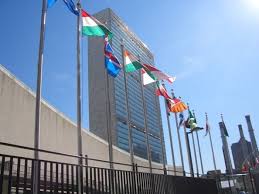
The United Nations General Assembly on Monday adopted, by consensus, Nigeria’s resolution to proclaim January 24 every year as the ‘International Day of Education’.
The News Agency of Nigeria (NAN) reports that all the 193-Member States of the UN General Assembly supported the Nigerian resolution, hence, there was no dissenting voice or abstention.
With its historic adoption on Monday, therefore, every January 24 will be celebrated all over the world as the International Day of Education, with the first being on January 24, 2019.
NAN also reports that the resolution, the first-ever on ‘International Day of Education’, was co-sponsored by Ireland, Singapore and Qatar, in partnership with the UN Educational, Scientific and Cultural Organisation, UN Children’s Fund, UN Women and Collegiate Congress and additional co-sponsors.
The resolution acknowledges “the importance of education for achieving sustainable development, including in the context of the achievements of the Millennium Development Goals, Agenda 21, the Plan of Implementation of the World Summit on Sustainable Development (Johannesburg Plan of Implementation).
“Others are the Education for All goals, the Global Action Programme on Education for Sustainable Development and the Incheon Declaration and Framework for Action for the implementation of Sustainable Development Goal 4”.
The Sustainable Development Goal 4 aims to “ensure inclusive and equitable quality education and promote lifelong learning opportunities for all”.
The resolution recognised “that education plays a key role in building sustainable and resilient societies and contributes to the achievement of all of the other Sustainable Development Goals.
The resolution also recognises that education increases the productivity of individuals and strengthens the potential for economic growth, develops the skills needed for decent work, develops the professional skills needed for sustainable development, including in the fields of water and sanitation, green energy and the conservation of natural resources.
Education also helps eradicate poverty and hunger, contributes to improved health, promotes gender equality and can reduce inequality, and promotes peace, the rule of law and respect for human rights”.
It acknowledged “the importance of working to ensure inclusive and equitable quality education at all levels – early childhood, primary, secondary, tertiary and distance education, including technical and vocational training – so that all people may have access to lifelong learning opportunities that help them to acquire the knowledge and skills needed to access opportunities to participate fully in society and contribute to sustainable development”.
The resolution “invites all Member States, organisations of the United Nations system, other international and regional organisations and civil society organisations, non-governmental organisations, faith-based organisations, academic institutions, the private sector, individuals and other relevant stakeholders to observe the International Day of Education in an appropriate manner and to continue to give consideration to enhancing international cooperation in support of the efforts of all Member States towards the realisation of Sustainable Development Goal 4”.
It also “invites the United Nations Educational, Scientific and Cultural Organisation, as the specialised United Nations agency for education, to facilitate the observance of 24 January of every year as the International Day of Education, mindful of the provisions contained in the annex to Economic and Social Council resolution 1980/67.”
The Nigerian resolution further “stresses that the cost of all activities that may arise from the implementation of the present resolution should be met from voluntary contributions”.
It, therefore, “requests the Secretary-General to bring the present resolution to the attention of all Member States, the organisations of the United Nations system and civil society organisations for appropriate observance”.
Nigeria’s Ambassador/Permanent Representative to the UN, Tijani Bande, had expressed confidence that the resolution would be overwhelmingly supported by the UN Member States, saying many countries have publicly declared their support for Nigeria.
Mr Bande said: “We would certainly have an overwhelming support; there is hardly any delegation that has opposed it.
“After three days of the silent procedure, not a single delegation has a dissenting voice because we negotiated, everybody has been on board”.
Bande called on all stakeholders to facilitate, the best way they could, the guaranteeing of education to all citizens all over the world wherever located, saying everybody agrees that education is deserving of a day to ponder over.
“Education, in terms of its liberation elements, the skills it provides, the sense of community, it should help us relate and have tolerance in the world; these elements, all agreed to.
“Clearly, there is a connection between educational attainments of countries and their development, including their peace,” he said.
Bande pointed out that none of the SDGs’ targets would be met without education adding, the relevance of education and its centrality to life itself is well understood.
“This day of reflection, which has brought all of us here, if it should have meaning, should galvanise us to support action to ensure that every human being has a right and that right is guaranteed and actualised for the education to the extent he or she is capable.
“And constraints, be they of class, of religion, of language, of location, should be of no consequence in giving support to all human beings to have education
NAN recalls that a side event organised by Nigeria on Friday to promote the resolution was greeted with overwhelming support from all stakeholders, including the United States, UN agencies, Ivy League institutions, and civil society organisations.
The stakeholders, who converged on the UN headquarters in New York, praised Nigeria for its initiative to sponsor the resolution.











